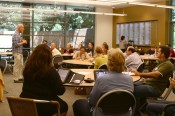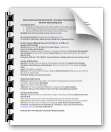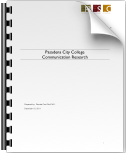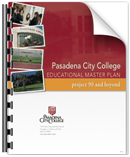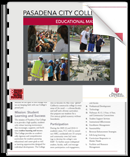New Faculty Learning Community: Innovative Teaching for Social Justice
The 2011-2012 New Faculty Learning Community: Innovative Teaching for Social Justice (ITSJ) began with a 3-day institute from August 23rd to August 25th. The ITSJ workshops focused on a number of topics:
- Effective Practices for First-Year Students (Nika Hogan and Shelagh Rose Facilitators)
- Syllabus Redesign (Donna Nordstrom Facilitator)
- Inquiry, Assessment, Transformation, Design, Partnerships, and Pathways (Salomon Davila and Deborah Bird, Facilitators)
- Teaching Our Diverse Students (Beverly Tate, Tooktook Thongthiraj, Silvia Villanueva, and Nika Hogan Facilitators)
- Introduction to Reading Apprenticeship Philosophy, Framework, Techniques (Nika Hogan Facilitator)
- 21st Century Teaching-Blackboard 9.1 (Leslie Tirapele Facilitator)
As a follow-up to the ITSJ Institute, new faculty are attending a semester-long course led by a number of Pasadena City College faculty and staff. The learning outcomes focus on integrating an understanding of the whole student into the syllabus and course design, using technology and other innovative practices to engage 21st century students, and developing a familiarity with PCC’s campus culture and operations.
The text for the course, What the Best College Teachers Do, by Ken Bain, is an exploration of how college professors conceptualize their best practices. Bain presents six major conclusions from his study regarding effective college instruction:
- Outstanding instructors know their subjects extremely well.
- Exceptional teachers treat their lectures, discussion sections, problem-based sessions, and other elements of teaching as serious intellectual endeavors as intellectually demanding and important as their research and scholarship.
- The best teachers expect more of their students.
- The best teachers try to create a natural critical learning environment.
- Highly effective teachers tend to reflect a strong trust in students. They usually believe that students want to learn, and they assume, until proven otherwise, they can.
- All extraordinary teachers have some systematic program to assess their own efforts and to make appropriate changes.
After completing this course, new faculty will be invited to attend a Winter Institute on Action Research, which will follow with investigating a research question for the spring semester.

